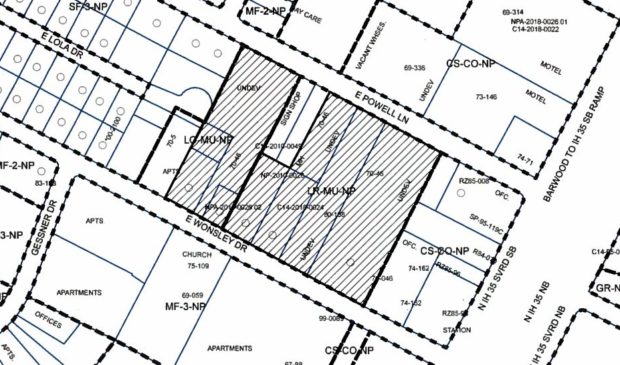Powell Lane apartments win first-round OK
Wednesday, September 5, 2018 by
Jo Clifton City Council last week unanimously approved on first reading a zoning change for 8 acres in North Central Austin with just a few questions and little discussion. The developer’s representative, Alice Glasco, said the magic words – affordable housing – so regardless of neighborhood objections, Council will likely grant a minimal zoning change when the matter comes back to Council at the end of September.
The requested zoning change from neighborhood mixed use and mixed use/office to multifamily land use for 411 and 601 E. Powell Lane and six addresses on E. Wonsley Drive in District 4 would allow the developer to build an extra 38 units, so instead of building 220 units, he will build 258. Under the current zoning, Glasco said, all of the units would be efficiencies. The new zoning will allow for one- and two-bedroom units as well as efficiencies.
Ron Kowal, vice president of the Austin Affordable Housing Corporation, a part of the Housing Authority of the City of Austin, said he is working with the developer to ensure that the majority of the units are affordable.
Kowal told Council that 85 percent of the 258 units would rent to people with incomes at 60 percent of the median family income or below. Only 39 of the units would be rented at market rates, he said, noting that HACA had entered into a memorandum of understanding with the developer and “we’re looking forward to doing something really neat here.”
He said the development would include a large community room as well as a swimming pool and other amenities. In response to a question from Mayor Pro Tem Kathie Tovo, Kowal laid out the number of one- and two-bedroom units, which would be suitable for families with children.
Glasco told the Austin Monitor it was necessary to request first reading only because the property owner has to sign a public restrictive covenant and dedicate right of way. “There is this treaty that has to be signed” by the current property owner, she said, and her client, Sam Kumar, will not purchase the property until after that happens.
Glasco explained that the neighborhood wants the city to look at area needs beyond this particular neighborhood.
Lyn Galbreth, a member of the North Lamar/Georgian Acres Neighborhood Plan Contact Team, said she and her neighbors are opposed to the change. As she told the Planning Commission in July, “We’re not knee-jerk opposed to more density, we’re not opposed to more affordable housing,” but the neighborhood wants to see more people who are “invested” in the community via homeownership. She noted that more than 80 percent of the units in the neighborhood are rentals, compared to 55 percent citywide.
“This project asks us to undermine our neighborhood plan,” city zoning principles and the city’s own housing blueprint, Galbreth told Council. She made it clear that she and her neighbors expect the city to provide some benefits in return for the affordable housing.
Galbreth said Council Member Greg Casar had been facilitating the conversations, but it isn’t clear how the city can provide amenities for people who simply don’t want any more apartment dwellers in their neighborhood. Casar noted that the city of Austin and Central Health both own parcels close to the proposed new apartments and suggested that they look at those parcels to see how they might be used.
Staff’s recommendation states that they support the request for multifamily zoning, finding that it is appropriate at this location and “will serve as a buffer between commercial uses along I-35 and the single-family uses abutting the property to the west.” In addition, staff said the development could help the city reach its goal of providing additional housing units as set forth in the housing blueprint.
Included in the backup for the case was a public hearing comment form from Elizabeth Robbins, who wrote, “I do not want the apartment community and other plans for the proposed development in this neighborhood please. More crowding, bedbugs and roaches just make poor neighborhoods worse. Please no more developing.”
The Austin Monitor’s work is made possible by donations from the community. Though our reporting covers donors from time to time, we are careful to keep business and editorial efforts separate while maintaining transparency. A complete list of donors is available here, and our code of ethics is explained here.
You're a community leader
And we’re honored you look to us for serious, in-depth news. You know a strong community needs local and dedicated watchdog reporting. We’re here for you and that won’t change. Now will you take the powerful next step and support our nonprofit news organization?











